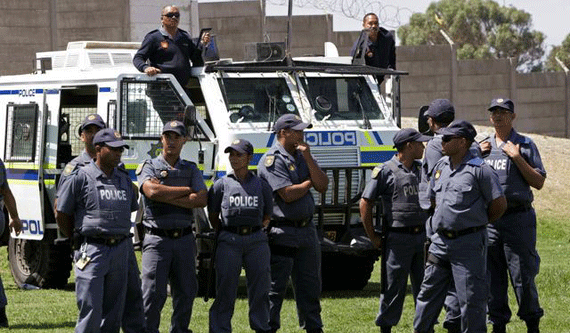
JOHANNESBURG — Several international law experts have described the decision by the South African Police Service (Saps) not to investigate the torture of opposition activists in the run-up to the 2008 elections in Zimbabwe as “irrational and unreasonable”.
Professor John Dugard, former United Nations special rapporteur on human rights in the Occupied Palestinian Territory, University of London criminal law professor Kevin Heller, Stellenbosch University law professor Gerhard Kemp and UCT international law lecturer Hannah Woolaver have joined the case as amici curiae (friends of the court).
Police commissioner-General Riah Phiyega is appealing against the Supreme Court of Appeal’s 2013 judgment declaring that the Saps is empowered to investigate the alleged offences irrespective of whether or not the alleged perpetrators are present in South Africa. Police declined to investigate as such action “would unavoidably violate Zimbabwe’s sovereignty”.
In May 2012, the North Gauteng High Court set aside then acting police boss Tim Williams’s June 2009 decision not to investigate the complaints laid by the Southern African Human Rights Litigation Centre (SALC) and the Zimbabwe Exiles Forum (ZEF) that certain officials committed crimes against humanity against Zimbabwean nationals in Zimbabwe.
Also joining the matter are the Netherlands’ Peace and Justice Initiative, a network of international criminal law professionals, and US non-governmental organisation the Tides Centre, which campaigns for effective prosecution of sexual violence as a crime against humanity, to prevent heinous crimes such as rape and torture, and to ensure that South Africa does not become a safe haven for perpetrators of such crimes.
Wits University’s Centre for Applied Legal Studies, which Dugard founded, is also amicus curiae.
Dugard, Heller, Kemp and Woolaver say that international law permits — but does not require — South Africa to probe allegations of torture, whether systematic or otherwise, committed in Zimbabwe, without the suspects being present in South Africa.
“Under domestic law, the decision not to investigate was irrational and unreasonable. It was irrational because no proper preliminary investigation was conducted to determine whether further investigation was appropriate,” they say.
- Chamisa under fire over US$120K donation
- Mavhunga puts DeMbare into Chibuku quarterfinals
- Pension funds bet on Cabora Bassa oilfields
- Councils defy govt fire tender directive
Keep Reading
The experts argue: “Given the proximity of South Africa to Zimbabwe, the fact that some of the suspects have previously been in South Africa, and the frequent travel to South Africa by Zimbabwean government officials, there is clearly some prospect some of the suspects will visit South Africa in the future. While their future presence is not certain, it is likely.”
Police admitted that by 2010 some of the perpetrators had visited the country.
Dugard, Heller, Woolaver and Kemp say that under international law there was no reason for the Saps and the National Prosecuting Authority not to investigate the claims of torture and brutality.
The Supreme Court of Appeal also ordered that police are required to initiate an investigation under the Implementation of the Rome Statute of the International Criminal Court (ICC) Act into the alleged offences. Zimbabwe is not a signatory to the ICC.
In papers filed at the Constitutional Court, Phiyega says a SALC and ZEF memorandum on the allegations of torture suggests police brutality and excess were committed in the normal exercise of criminal investigations.
“If these serious allegations are true, they are deprecated. But, even if true, this does not constitute a crime against humanity,” reads Phiyega’s founding affidavit.
In March 2008, the SALC sent a detailed 50-page memorandum to the NPA’s priority crimes litigation unit, which is dedicated to combating, investigating and prosecuting crimes in the ICC Act.
The memorandum listed allegations of crimes against humanity involving mainly torture carried out by Zimbabwean officials.
It implicated 18 high-level Zanu PF and law and order unit members as alleged perpetrators, which the SALC has declined to identify, as well as the victims.
But police told the SALC the documentary evidence did not assist the Saps in probing the matter.
“Very extensive (and, indeed, impractical, if not impossible) investigations would be required by Saps before the Rome Statute’s chapeau requirement (which is applicable to all crimes against humanity, including torture) is satisfied,” says Phiyega.
Zimbabwean exiles and the SALC say that country’s police, under orders from the ruling Zanu PF, raided Harvest House, the headquarters of the opposition MDC-T, in March 2007.
More than 100 people — mostly MDC-T supporters and officials, as well as workers in nearby shops and offices — were taken into custody for several days and continuously and severely tortured.
The Tides Centre says the Saps should carry out a full investigation, as it has important evidence, and because no other credible authority will bring those responsible to justice.
“It is only after an investigation has commenced and, in some cases, is either under way or even complete that the Saps can take a rational or reasonable decision regarding its next step,” it argues.
It says police cannot make a determination on the likely presence of an accused, or use that decision to terminate the investigation, as this would be putting the cart before the horse.
According to the Peace and Justice Initiative, an investigation cannot be avoided purely because there may ultimately be an insufficient basis for prosecution.
In its submission, the Centre for Applied Legal Studies says the alleged crimes committed in Zimbabwe would, if established, constitute violations of rights guaranteed in the African Charter on Human and Peoples’ Rights, to which both countries are parties.
The charter prohibits exploitation and degradation, including torture and cruel or degrading treatment.
The Constitutional Court will hear the matter today.
— Sunday Independent










